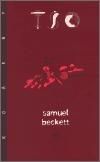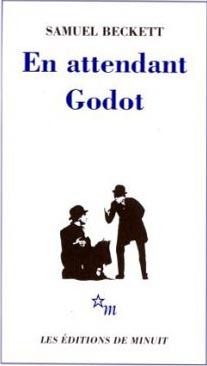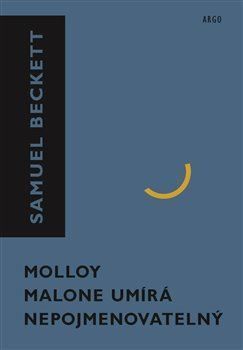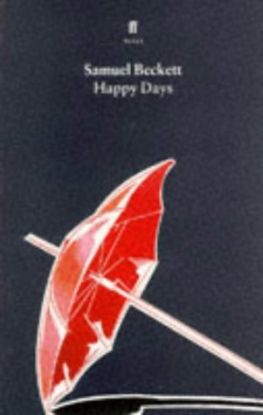Samuel Beckett
autor
Tso
Poslední zcela zásadní dílo Samuela Becketta, které se dosud neobjevilo v českém překladu. Tso je druhý Beckettův román (po Murphym), který byl napsán na konci války, ale vyšel v angličtině poprvé v Paříži roku 1953. Podobně jako Murphy je mnohavrstevným portrétem člověka, který sám je ztělesněním mnoha myšlenek a názorů, vyjadřujícím svébytnou filozofii o lidských možnostech v moderní době, ale zároveň je naprosto skvělým dílem humoristickým. Tso patří k Beckettovým nejčtivějším a nejopěvovanějším románům.
En Attendant Godot
L'attente comprend deux phases, l'ennui et l'angoisse. La pice comprend donc deux actes, l'un grotesque, l'autre grave. Préoccupé de peu de choses hormis ses chaussures, la perspective de se pendre au seul arbre qui rompt la monotonie du paysage et Vladimir, son compagnon d'infortune, Estragon attend. Il attend Godot comme un sauveur. Mais pas plus que Vladimir, il ne connaît Godot. Aucun ne sait au juste de quoi ce mystérieux personnage doit les sauver, si ce n'est peut-tre, justement, de l'horrible attente. Liés par un étrange rapport de force et de tendresse, ils se haranguent l'un et l'autre et s'affublent de surnoms ridicules. Outre que ces diminutifs suggrent que Godot pourrait bien tre une synthse qui ne se réalisera qu'au prix d'un anéantissement, Didi et Gogo portent en leur sein la répétition, tout comme le discours de Lucky, disque rayé qui figure le piétinement incessant auquel se réduit toute tentative de production de sens. Cette pice composée en 1952, quinze ans avant que Beckett ne soit couronné par le prix Nobel de littérature, est un tour de force qui démontre les profondeurs que peut atteindre un langage en apparence absurde.
Na sklade 1Ks
8,61 €
9,06 €
Čekání na Godota
Jedno z vrcholných děl absurdního divadla vešlo ve všeobecnou známost a název hry se stal běžně používaným výrazem pro marná očekávání. Hra s komorním obsazením z roku 1952 si získala světový věhlas a svým pohledem, který nezapře autorovu inspiraci existencionalismem, svou hloubkou i způsobem vyprávění příběhu oslovuje i dnešní generaci čtenářů a diváků. V překladu Karla Krause vychází jako 138. svazek edice D.
Watt
Samuel Beckett Watt című regénye különös olvasmány, cselekményét leírni szinte
lehetetlen. Watt-tal történnek bizonyos dolgok, tesz bizonyos dolgokat, részt vesz bizonyos
beszélgetésekben, majd a történet egy bizonyos, jelentőségteljes módon véget ér.
Mindeközben az olvasó ámuldozik a szerző lenyűgözően összetett prózáján, elképesztő
kitérőin, fergeteges humorán. A meghökkentő regény Beckett tán legjelentősebb kísérlete
annak ábrázolására, hogy a létezésben értelmet találnunk egyszerre szükségszerű
és lehetetlen, még sincs más választásunk, mint kutatni a lét értelmét. Az évtizedekig
lefordíthatatlannak tartott művet Dragomán György fordításában közöljük.
Herecký portrét Olgy Scheinpflugové
Herecký portrét Olgy Scheinpflugové - audiokniha obsahuje několik ukázek z hereckých rolí Olgy Scheinpflugové.
Na stiahnutie
2,53 €
Waiting for Godot (EN)
Audiobook Waiting for Godot. Samuel Beckett, one of the great avant-garde Irish dramatists and writers of the second half of the twentieth century, was born on 13 April 1906. He died in 1989. He won the Nobel Prize for Literature in 1969. His centenary will be celebrated throughout 2006 with performances of his major plays, but the most popular of them all will be, without doubt, the play with which he first made his name, Waiting for Godot.
Na stiahnutie
8,00 €
Významné inscenace Mahenovy činohry v Brně
Z komentáře k původnímu 2LP albu 0 58 0406 "Významné inscenace Mahenovy činohry v Brně" vydanému v Supraphonu v roce 1973 a nyní vycházejícímu poprvé digitálně: Vytrhávat z živého organismu divadelních inscenací úryvky jednotlivých scén a výstupů, jejichž smysl vyplývá teprve z celkového kontextu a celistvé podoby; redukovat úhrnný audiovizuální dojem z představení na záležitost toliko zvukovou; oklešťovat schopnosti herců hrát duší i tělem na pouhý mluví výraz - není to počínání už v samé podstatě pošetilé a pochybené? A sotvaže jsme vyslovili tuto první a zásadní námitku, už se hlásí o slovo další.
Na stiahnutie
5,09 €
Molloy, Malone umírá, Nepojmenovatelný, 3. vydanie
Trilogie Molloy, Malone umírá a Nepojmenovatelný má v Beckettově prozaickém díle stejně zásadní postavení jako Čekání na Godota či Konec hry v jeho díle určeném pro divadelní scénu. Radikální „antirománová“ forma, spojená s rozpadem vypravěčského vědomí a stále vyhrocenější anonymitou, se jedinečným způsobem pojí se skeptickým a černým humorem. Beckett zde naplňuje své autorské krédo, že úkolem umělce je selhávat lépe než kdokoli jiný, a vytváří jeden z mála modernistických textů, který lze bez rozpaků stavět vedle díla Franze Kafky. Individuální hrdina se zřetelnými obrysy mizí, ohniskem vyprávění se místo něj stává nejistota a kupící se vědomí nicoty lidské existence. Prózy původně psané francouzsky a poté autorem převedené do angličtiny mistrovsky přeložil Tomáš Hrách.
Molloy, Malone umírá, Nepojmenovatelný
Trilogie Molloy, Malone umírá a Nepojmenovatelný má v Beckettově prozaickém díle stejně zásadní postavení jako Čekání na Godota či Konec hry v jeho díle určeném pro divadelní scénu. Radikální "antirománová" forma, spojená s rozpadem vypravěčského vědomí a stále vyhrocenější anonymitou, se jedinečným způsobem pojí se skeptickým a černým humorem. Beckett zde naplňuje své autorské krédo, že úkolem umělce je selhávat lépe než kdokoli jiný, a vytváří jeden z mála modernistických textů, který lze bez rozpaků stavět vedle díla Franze Kafky. Individuální hrdina se zřetelnými obrysy mizí, ohniskem vyprávění se místo něj stává nejistota a kupící se vědomí nicoty lidské existence. Prózy původně psané francouzsky a poté autorem převedené do angličtiny mistrovsky přeložil Tomáš Hrách.
Na stiahnutie
23,43 €
Los dias felices
Los días felices (Happy Days, en inglés) es una obra de teatro en dos actos, escrita en inglés por el dramaturgo y narrador irlandés Samuel Beckett. Empezó a escribirla el 8 de octubre de 1960 y fue terminada el 14 de mayo de 1961.? Beckett terminó la traducción de la misma al francés hacia noviembre de 1962, con una pequena variación en el título. «En un momento de inspiración tomó el título Oh les beaux jours del poema de Verlaine Colloque sentimental».
En esta obra clásica del teatro del absurdo, la protagonista, Winnie, es una senora de mediana edad que aparece en escena semienterrada en un montículo calcinado, bajo una luz cegadora. Pese a ello, a través de un ritual de gestos cotidianos, encuentra siempre motivos, por insignificantes que sean, para considerar sus «días felices». Según Ma Antonia Rodríguez-Gago, traductora al castellano de la obra, su tema central es el deterioro físico y mental. El rebuscado lenguaje de la protagonista, por ejemplo, refleja especialmente su pérdida de memoria. Otra característica llamativa, única en el teatro de Beckett, es que el personaje recurre constantemente a las citas literarias, las cuales aparecen distorsionadas, al presentarse en fragmentos mal recordados. El otro personaje de la obra, su esposo Willie, vive obsesionado por el sexo y una postal pornográfica que guarda. Hallándose totalmente separado de su esposa, detrás de su montículo, refleja la ironía situacional de la pieza, pues su deterioro anadido pone de manifiesto la futilidad de los apetitos físicos a los que se aferra.
La obra fue traducida y estrenada por primera vez en Espana en 1963.
Na stiahnutie
6,00 €
Final de partida
Final de partida (Endgame en inglés o Fin de partie en francés) es un drama en un acto para cuatro personajes, escrito por el dramaturgo y escritor irlandés Samuel Beckett. Fue redactado originalmente en francés, con el título Fin de partie, y, como era su costumbre, el propio Beckett lo tradujo al inglés, como "Endgame", al ano siguiente de su publicación. Fue publicado en 1957, y es comúnmente considerado, junto con obras como Esperando a Godot, entre los más importantes trabajos de su autor.
La obra está dedicada a Roger Blin, el director que había estrenado Esperando a Godot en París, quien habría buscado sin éxito un teatro donde estrenarla en esa ciudad.1? Se estrenó en Londres, en el Royal Court Theatre, tras aceptar la invitación de George Devine, en abril de 1957. A posteriori, ese mismo mes, se estrenó en París, en el Studio des Champs Élysées. También en 1957, lo hizo en Berlín, con el título de Endspiel. En junio de ese mismo ano se estrenó en Espana, dirigida por Alberto González Vergel.
Sus protagonistas son Hamm, un viejo amo que está ciego y no puede permanecer de pie, y su sirviente, llamado Clov, que no puede sentarse. Viven en una pequena casa junto al mar, aunque a veces el diálogo sugiere que no hay nada fuera de la casa, ni mar, ni sol, ni nubes. Los dos personajes, mutuamente dependientes, siempre se han llevado mal, y así se ve a lo largo de la obra. Clov a veces muestra una remota intención de librarse de su yugo, pero nunca es capaz de hacerlo. Los otros dos personajes que aparecen son los padres de Hamm, que no tienen piernas: Nagg y Nell, los cuales viven en sendos cubos de basura que aparecen en el escenario. De vez en cuando piden comida y hablan entre sí.
Na stiahnutie
2,00 €
Esperando a Godot
Esperando a Godot (en francés: En attendant Godot), a veces subtitulada Tragicomedia en dos actos, es una obra perteneciente al teatro del absurdo, escrita a finales de los anos 1940 por Samuel Beckett y publicada en 1952 por Éditions de Minuit. Beckett escribió la obra originalmente en francés, su segunda lengua. La traducción al inglés fue realizada por el mismo Beckett y publicada en 1955.
La obra se divide en dos actos, y en ambos aparecen dos vagabundos llamados Vladimir y Estragon que esperan en vano junto a un camino a un tal Godot, con quien (quizás) tienen alguna cita. El público nunca llega a saber quién es Godot, o qué tipo de asunto han de tratar con él. En cada acto, aparecen el cruel Pozzo y su esclavo Lucky (en inglés, «afortunado»), seguidos de un muchacho que hace llegar el mensaje a Vladimir y Estragon de que Godot no vendrá hoy, "pero manana seguro que sí".
Esta trama, que intencionalmente no tiene ningún hecho relevante y es altamente repetitiva, simboliza el tedio y la carencia de significado de la vida humana, tema recurrente del existencialismo. Una interpretación extendida del misteriosamente ausente Godot es que representa a Dios (en inglés: God), aunque Beckett siempre negó esto. Beckett afirmó que derivaba de godillot, que en jerga francesa significa bota. El título podría entonces sugerir que los personajes están esperando «a la bota».? Como nombre propio, Godot también puede ser un derivado de diferentes verbos franceses.
Na stiahnutie
2,00 €
Čekání na Godota, 2. vydání
Jedno z vrcholných děl absurdního divadla vešlo ve všeobecnou známost a název hry se stal běžně používaným výrazem pro marná očekávání. Hra s komorním obsazením z roku 1952 si získala světový věhlas a svým pohledem, který nezapře autorovu inspiraci existencionalismem, svou hloubkou i způsobem vyprávění „příběhu“ oslovuje i dnešní generaci čtenářů a diváků. V překladu Karla Krause vychází jako 138. svazek edice D.
First Love And Others Novella
This new collection brings together "First Love", "The Calamative", "The End" and "The Expelled", these four novellas are among the first major works of Beckett's decision to use French as his language of literary composition. Rich in verbal and situational humour, they offer a fascinating insight into many of the issues which preoccupied Beckett all his working life. As the first novella reveals, nobody writes with quite such cruel and unnervingly clever wit as Beckett...
Vypredané
12,58 €
13,24 €
Happy Days
In 'Happy Days, ' Beckett pursues his relentless search for the meaning of existence, probing the tenuous relationships that bind one person to another, and each to the universe, to time past and time present.
Vypredané
14,79 €
15,57 €
Nepojmenovatelný
Třetí část netradiční trilogie tzv. antirománů od jedné z největších literárních postav 20. století, která není jen základním dílem absurdní a experimentální prózy a samotným vrcholem Beckettovy tvorby, ale je naprosto originálním dílem svébytného
Vypredané
9,88 €
10,40 €


















